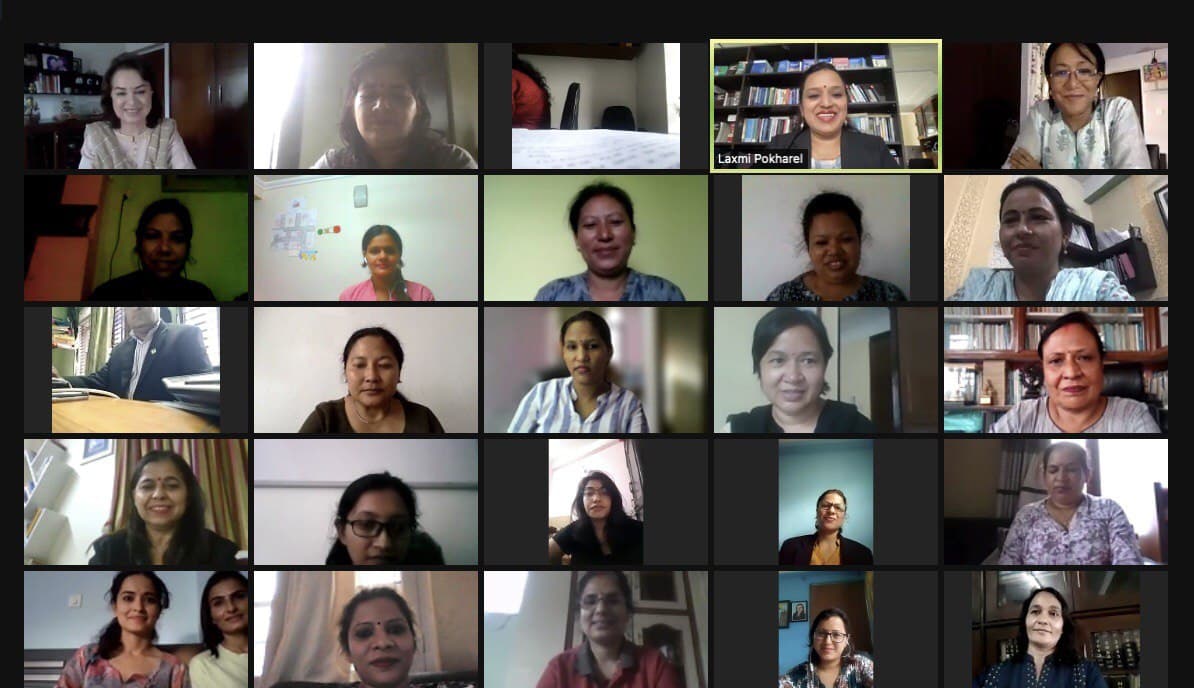Nepal’s judiciary must overcome gender stereotypes to improve women’s access to justice in the country, said participants at a workshop organized by the ICJ and the Supreme Court Bar Association’s Women Lawyers Committee on 24th and 25th September, 2021.
The workshop on “Eliminating Gender Discriminatory Attitudes and Behaviours Towards Women and Enhancing Access to Justice for Women” brought together around 50 lawyers, including the representatives from different bar associations of Kathmandu valley and lawyers affiliated with legal aid organizations.
The major objective of the workshop was to assist the Nepalese legal aid lawyers in their efforts to identify gender discriminatory practices in the legal profession and the Nepalese justice system in order to enhance access to justice for women.
Boram Jang, International Legal Adviser of the ICJ and team leader of the Women’s Access to Justice project, highlighted that despite the progressive Constitution, in terms of gender equality and proportional participation of women in all state structure, many gender stereotypes still exist in law and practice in Nepal. These gender stereotypes include the ‘virtuous-or-good-woman-versus-bad-woman” stereotypes, which spawn a continuum of related gender stereotypes in gender-based violence cases. Other stereotypes impact women’s access to justice beyond cases involving gender-based violence, e.g. the widespread belief that women, unlike men, are weak in the physical and cognitive sense, and their gendered roles in the family, etc. Such gender stereotypes are major barriers for women on accessing justice, which need to be eliminated.
Ms. Bandana Rana, member of the UN CEDAW Committee facilitated a session on CEDAW and principle of equality, non-discrimination and state obligation, linking it with the fundamental rights guaranteed by the Nepalese Constitution. She also discussed the role that lawyer can play on domesticating CEDAW as well as eliminating gender stereotypes and discriminatory behaviours.
Justice Sapana Pradhan Malla, Justice of the Supreme Court of Nepal facilitated a session on women’s access to justice under international law. She discussed issues in the justice system including lack of victim friendly infrastructure, lengthy and lethargic legal procedures, lack of victim and witness protection mechanism and lack of information dissemination to the victims about their rights, which are major barriers to accessing justice by women. She also highlighted role of lawyers to address such barriers with litigation, research as well as national and international advocacy.
Ms. Evalyn G. Ursua, attorney from the Philippines discussed with the participants how gender inequality is built on gender norms, gender roles and unequal gender relations. The session highlighted that gender inequality is sustained through the perpetuation of gender stereotypes and justice actors have critical roles in eliminating them.
These sessions were followed by a panel discussion on gender stereotype and gender discrimination in the legal profession where Senior Advocate Dr. Sushma Baskota Baral from Nepal and Marienne M Ibadlit, Chairperson for the Gender and Development Committee (GAD) of the Integrated Bar Association of the Philippines (IBP) discussed the issues and made the suggestions on how lawyers can avoid such practices at the institutional level.
During the panel discussion on the role of legal aid providers in enhancing women’s access to justice in Nepal, Senior Advocate Usha Malla Pathak, Advocate Rakshya Basyal, Advocate Tek Tamata and Advocate Anita Neupane Thapaliya spoke about the legal provisions, practical issues and barriers to accessing justice for women.
The participants agreed that the Bar Association has to play a vital role to eliminate discriminatory attitudes and behaviours. The participants also said that there is a need to have a regional level discussion with lawyers from South Asia to share experience and build strategies on how such stereotypes, and discriminatory attitudes and behaviours could be addressed in the region.
The workshop was organized under the ‘Enhancing Access to Justice for Women in Asia and the Pacific’ project funded by the Swedish International Development Cooperation Agency (SIDA). Due to the COVID–19 pandemic, the workshop was conducted virtually via Zoom. Simultaneous translation in English and Nepali language was available in the workshop.
Contact
Laxmi Pokharel, ICJ Legal Adviser – Nepal, e:laxmi.pokharel(a)icj.org





